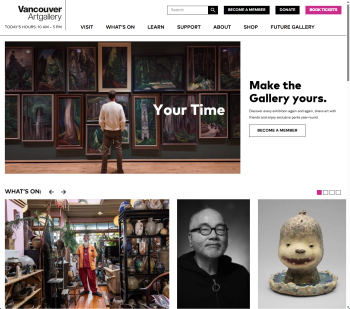Vancouver Art Gallery
Founded in 1931, the Vancouver Art Gallery (VAG) is Western Canada’s premier visual arts institution. Housed since 1983 in the former provincial courthouse designed by Francis Rattenbury (opened 1911), the 15,300 m² space serves as a cultural hub downtown. VAG is a charitable non-profit supported by members, donors, the City of Vancouver, Province, BC Arts Council and Canada Council for the Arts.
Collections & Exhibitions
- The Gallery's permanent collection encompasses over 13,000 artworks, including an extensive Emily Carr holdings, leading photography and First Nations art, the strongest photo-conceptual collection via the “Vancouver School”.
- Year-round programming includes historical and contemporary exhibitions, public and scholarly events, and the Centre for Global Asias (established 2014).
Public Programs & Accessibility
- VAG hosts more than 60 annual events: lectures, artist talks, music, dance (e.g. FUSE series), and described tours designed for visually impaired visitors.
- Free initiatives include First Free Fridays and complimentary youth access; facilities include wheelchair accessibility, lockers, and a welcoming visitor lounge.
Visitor Experience
- Located at 750 Hornby Street, adjacent to Robson Square, open Mon–Thu/Sat/Sun 10–17, Fri 10–20, summer Tuesdays included.
- Services include a gallery store, café, event rentals, and volunteer-led school or family tours.
Governance & Mission
- Guided by a mission to “share perspectives, build and engage communities, and shape collective future.” VAG emphasizes inclusivity, equity, accessibility, and respect for unceded Musqueam, Squamish and Tsleil-Waututh territories.
- Supported by Vancouver Art Gallery Association, a registered charitable organization.
Assessment
VAG offers a powerful balance of regional, Indigenous, and global art, housed within a heritage landmark that enhances its atmosphere. Its strengths lie in programming diversity and public engagement. Limitations include space constraints and evolving building infrastructure. Recent efforts toward new building planning and digital expansion suggest a forward-looking institution. Overall, VAG remains a vital cultural anchor for Greater Vancouver.

